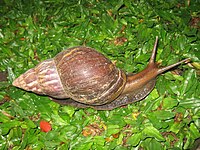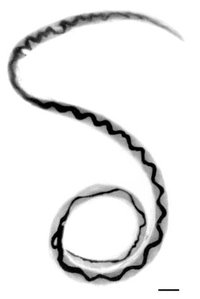
Physiology and immunity of the invasive giant African snail, Achatina (Lissachatina) fulica, intermediate host of Angiostrongylus cantonensis.
Sign Up to like & getrecommendations! Published in 2019 at "Developmental and comparative immunology"
DOI: 10.1016/j.dci.2019.103579
Abstract: As one of the most successful invasive land snail species, Achatina (Lissachatina) fulica Bowdich, 1822 has achieved wide global distribution, particularly in (sub)tropical regions, with further dispersal likely due to climate change. This species of… read more here.
Keywords: cantonensis; physiology; snail; fulica ... See more keywords

Biological and histological changes in reproductive patterns of Biomphalaria glabrata experimentally co-infected by Echinostoma paraensei and Angiostrongylus cantonensis.
Sign Up to like & getrecommendations! Published in 2018 at "Experimental parasitology"
DOI: 10.1016/j.exppara.2018.10.005
Abstract: Investigation of co-infection by different helminths in snails can provide essential information about the biology of parasites co-existence under natural conditions. This study aimed to investigate the reproductive and histological changes of Biomphalaria glabrata experimentally… read more here.
Keywords: experimentally infected; biomphalaria glabrata; histological changes; paraensei ... See more keywords

First record of natural infection by Angiostrongylus cantonensis (Nematoda: Metastrongyloidea) in Belocaulus willibaldoi and Rattus norvegicus in an urban area of São Paulo city, SP, Brazil
Sign Up to like & getrecommendations! Published in 2020 at "Heliyon"
DOI: 10.1016/j.heliyon.2020.e05150
Abstract: Angiostrongylus cantonensis, a rat lungworm, is one of the leading causes of eosinophilic meningitis in humans. Infection in humans occurs by the ingestion of intermediate hosts, undercooked paratenic hosts or contaminated vegetables and fruits by… read more here.
Keywords: natural infection; infection; angiostrongylus cantonensis; cantonensis ... See more keywords

Eosinophilic meningoencephalitis associated with rat lungworm (Angiostrongylus cantonensis) migration in two nine-banded armadillos (Dasypus novemcinctus) and an opossum (Didelphis virginiana) in the southeastern United States
Sign Up to like & getrecommendations! Published in 2017 at "International Journal for Parasitology: Parasites and Wildlife"
DOI: 10.1016/j.ijppaw.2017.05.004
Abstract: Angiostrongylus cantonensis, the rat lungworm, was the cause of neural larval migrans in two nine-banded armadillos (Dasypus novemcinctus) and one Virginia opossum (Didelphis virginiana) from the southeastern United States. Histologic findings in all three cases… read more here.
Keywords: rat lungworm; southeastern united; angiostrongylus cantonensis; cantonensis ... See more keywords

Heterologous expression of three antigenic proteins from Angiostrongylus cantonensis: ES-7, Lec-5, and 14-3-3 in mammalian cells.
Sign Up to like & getrecommendations! Published in 2018 at "Molecular and biochemical parasitology"
DOI: 10.1016/j.molbiopara.2018.03.001
Abstract: Angiostrongylus cantonensis is a parasitic nematode and the main causative agent of human cerebral eosinophilic meningoencephalitis (EoM). A definitive diagnosis of EoM usually requires serologic or molecular analysis of the patient's clinical sample. Currently, a… read more here.
Keywords: antigenic proteins; angiostrongylus cantonensis; cantonensis; mammalian cells ... See more keywords

Mitochondrial dynamics in Angiostrongylus cantonensis-infected mouse brain.
Sign Up to like & getrecommendations! Published in 2020 at "Parasitology international"
DOI: 10.1016/j.parint.2020.102231
Abstract: Angiostrongylus cantonensis is one of the most widespread parasites causing central nervous system (CNS) diseases in mammals. Since the mitochondrion is an essential cell organelle responsible for both physiological and pathological processes, its dysfunction might… read more here.
Keywords: mouse brain; cantonensis infected; angiostrongylus cantonensis; cantonensis ... See more keywords

Application of the Midi Parasep® SF technique for the detection of L1 larvae of Angiostrongylus cantonensis in faeces of infected rats
Sign Up to like & getrecommendations! Published in 2023 at "Journal of Helminthology"
DOI: 10.1017/s0022149x23000251
Abstract: Abstract We investigated parasitic zoonoses caused by protozoans and helminths in urban and peri-urban rat populations (Rattus norvegicus and R. rattus) in Spanish cities. Rats were trapped and then dissected to remove adult helminths, and… read more here.
Keywords: cantonensis; infected rats; larvae; application midi ... See more keywords

In vitro efficacy of anthelmintics on Angiostrongylus cantonensis L3 larvae
Sign Up to like & getrecommendations! Published in 2020 at "Parasitology"
DOI: 10.1017/s0031182020001146
Abstract: Abstract Angiostrongylus cantonensis is the leading cause of eosinophilic meningitis worldwide, with life-threatening complications if not managed correctly. Previous in vitro studies have utilized change in motility patterns of adult female worms to assess the… read more here.
Keywords: vitro efficacy; efficacy anthelmintics; efficacy; angiostrongylus cantonensis ... See more keywords

A validated high-throughput method for assaying rat lungworm (Angiostrongylus cantonensis) motility when challenged with potentially anthelmintic natural products from Hawaiian fungi
Sign Up to like & getrecommendations! Published in 2022 at "Parasitology"
DOI: 10.1017/s0031182022000191
Abstract: Abstract Abstract Parasitic nematodes devastate human and animal health. The limited number of anthelmintics available is concerning, especially because of increasing drug resistance. Anthelmintics are commonly derived from natural products, e.g. fungi and plants. This… read more here.
Keywords: cantonensis; natural products; motility; hawaiian fungi ... See more keywords

Genetic analysis of a 66-kDa protein-encoding gene of Angiostrongylus cantonensis and Angiostrongylus malaysiensis
Sign Up to like & getrecommendations! Published in 2022 at "Parasitology"
DOI: 10.1017/s0031182022001573
Abstract: Abstract Abstract The rat lungworm Angiostrongylus cantonensis is globally known to be the cause of oeosinophilic meningitis in humans. Another congener, Angiostrongylus malaysiensis, is closely related to A. cantonensis and has been described as a… read more here.
Keywords: cantonensis; kda protein; malaysiensis; cantonensis malaysiensis ... See more keywords

Rat lungworm (Angiostrongylus cantonensis) active larval emergence from deceased bubble pond snails (Bullastra lessoni) into water.
Sign Up to like & getrecommendations! Published in 2023 at "Parasitology"
DOI: 10.1017/s0031182023000434
Abstract: Angiostrongylus cantonensis (the rat lungworm) is a zoonotic parasite of non-permissive accidental (dogs, humans, horses, marsupials, birds) hosts. The 3rd stage larvae (L3s) in the intermediate host (molluscs) act as the source of infection for… read more here.
Keywords: cantonensis; angiostrongylus cantonensis; water; bullastra lessoni ... See more keywords